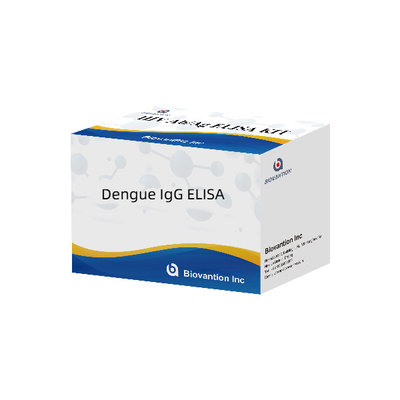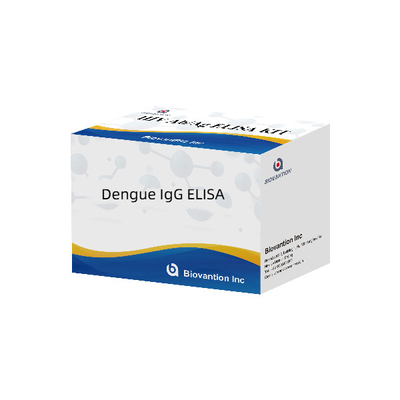Dengue IgG ELISA
Intended use
The Dengue lgG ELISA is for the qualitative detection of lgG antibodies to dengue antigen serotypes (1, 2, 3 and4) in serum
or plasma, as an aid in the clinical laboratory diagnosis of patients with clinical symptoms and past exposure consistent
with dengue fever. It may also be used to distinguish between primary and secondary dengue infection.
PRINCIPLE
This kit utilizes the indirect ELISA (Enzyme-Linked Immunosorbent Assay) principle to detect IgG antibodies against
dengue virus in human serum. The microplate strips are pre-coated with recombinant dengue virus antigens that
bind to the relevant antibodies in the samples. The specimens to be tested are added and incubated, allowing the
IgG antibodies in the specimens to bind to the antigens. The plate is then washed to remove any substances that do
not bind to the coated antigens. Enzyme-labeled reagents are added for a second incubation. When IgG antibodies
against dengue virus are present in the sample, a "coated antigen-IgG antibody-anti-human IgG enzyme conjugate"
complex is formed. After washing the plate again, a chromogenic substrate is added. The HRP (Horseradish
Peroxidase) attached to the complex catalyzes the reaction of the chromogenic substrate, generating a colored
product. Upon termination of the reaction, a yellow color develops. If there are no IgG antibodies against dengue
virus in the sample, no color will develop. The OD (Optical Density) value is measured using an ELISA reader or an
immunoassay system, and the presence of IgG antibodies against dengue virus is determined based on the OD value.
SUMMARY
Dengue fever(DF) and dengue hemorrhagic fever (DHF) are caused by one of 4 serotypes of the virus of the genus
Flavivirus that although closely related are antigenically distinct (DEN-1, DEN-2, DEN-3, and DEN-4). DF and DHF are
diseases of mainly tropical and subtropical areas. The 4 dengue serotypes are maintained in a cycle involving humans
and the Aedes mosquito. Infections produce a spectrum of clinical disease ranging from nonspecific viral syndrome
to severe and fatal bleeding disease. Clinical manifestations include rash, sudden onset of fever, chills, severe
headache, nausea, myalgia and arthralgia, leukopenia, thrombocytopenia and haemorrhagic manifestations.
Occasionally it produces shock and hemorrhage causing death. An important risk factor for DHF is the strain of virus
that causes the infection, as well asthe patient's age and especially the history of previous dengue infections.
Dengue viremia appears to be universal in febrile dengue patients; It occurs prior to the onset of fever and symptoms
and has a peak 2-3 days after the onset of the disease. A diagnosis of acute infection with dengue virus can be made
by isolating the virus or by detection of the viral genome or antigen. Serologically, a primary dengue infection results
in detectable levels of IgM antibodies by the third day of infection without fever. These IgM antibodies persist for 1-2
months after infection. IgG antibodies are detected approximately 14 days after the onset of primary infection.
Secondary infections with dengue virus are characterized by a rapid increase in IgG antibody levels. Due to the
relatively late increase in antibody levels to a diagnostically detectable concentration, a negative result of an
antibody detection test early in the course of the disease is not definitive. Samples should be collected at least 7 days
after the onset ofsymptoms to exclude the possibility of acute dengue virusinfection.
Serology is the most widely used technique in routine diagnosis. Traditionally, hemagglutination inhibition and virus
neutralization tests have been used. ELISAs for IgM and IgG antibodies are the standards for serological analysis of
dengue virus infections, as they are simple and allow testing of a large number ofsamples.
Technical Parameters:
| Product Name: |
CMV IgM ELISA Kit |
| Manufacturer: |
Biovantion |
| Format: |
Kit |
| Applications: |
Diagnosis |
| Assay Time: |
2-3 Hours |
| Sample Type: |
Serum, Plasma |
| Specificity: |
High |
| Sensitivity: |
High |
| Shelf Life: |
18 Months |
| Kit Size: |
96 Tests |

Specimen collection and preparation
• Human serum or plasma is recommended for this assay.
• Cap and store the samples at 18-25 ℃ for no more than 8 hours. Stable for 7 days at 2-8℃, and 1 month at -20℃. Freeze only once.
• Do not use heat-inactivated samples.
• Sediments and suspended solids in samples may interfere with the test result which should be removed by centrifugation. Ensure that complete clot formation in serum samples has taken place prior to centrifugation.
• Avoid grossly hemolytic, lipemic or turbid samples.
FAQ:
Q: What is the brand name of this test kit?
A: The brand name of this test kit is Biovantion.
Q: Where is this test kit manufactured?
A: This test kit is manufactured in China.
Q: Is this test kit certified?
A: Yes, this test kit is certified with ISO13485.
Q: What is the minimum order quantity for this product?
A: The minimum order quantity for this product is 10.
Q: What is the packaging details for this product?
A: The packaging details for this product is CARTON.
Q: What is the delivery time for this product?
A: The delivery time for this product is 7-15 days.
Q: What are the payment terms for this product?
A: The payment terms for this product is TT 100% PAYMENT.
Q: What is the supply ability for this product?
A: The supply ability for this product is 100000.
Q: Is the price of this product negotiable?
A: Yes, the price of this product is negotiable.

 Your message must be between 20-3,000 characters!
Your message must be between 20-3,000 characters! Please check your E-mail!
Please check your E-mail!  Your message must be between 20-3,000 characters!
Your message must be between 20-3,000 characters! Please check your E-mail!
Please check your E-mail! 


